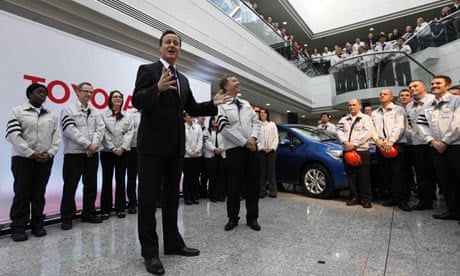Toyota has thrown a lifeline to workers threatened by job cuts at Britain's last remaining train factory, in Derby, by announcing plans for up to 1,500 new manufacturing posts in the area.
The carmaker offered some hope to staff at the troubled Bombardier rail plant when it designated its factory in nearby Burnaston as the European centre for its new generation of hatchback vehicles. Bombardier has announced plans to lose more than 1,400 staff after failing to win a £1.4bn government contract to make trains for the Thameslink rail route.
Toyota's deputy head of UK manufacturing, Tony Walker, said the company would be glad to receive applications from former and current Bombardier workers. "People who work in Derby are used to an environment where quality is first and foremost. They are people who are used to working in engineering and manufacturing. We will welcome applications from Bombardier and former Bombardier staff."
Mark Adams, Toyota's purchasing chief for Europe, said the recruitment drive would also benefit local suppliers that will provide parts for the new cars. "It is an announcement that secures the supply chain as well as creating jobs at Toyota."
David Cameron, whose government is trumpeting an export-led recovery, toured the Burnaston plant on Thursday to hail the announcement. More than eight out of 10 of all vehicles made at Burnaston are exported.
During his visit, the prime minister said UK car manufacturing industry was seeing a "renaissance" that has included the creation of 1,750 jobs at Jaguar Land Rover. However, experts say the resurgence is a result of the strength of markets such as India and China, rather than the domestic market, which is reflecting the weak UK economy.
"The British car industry is doing well and that's because of the quality of our workforce, the quality of our skills and the fact that Britain is a pro-manufacturing country that wants to succeed in this industry," said Cameron, adding that he hoped the recovery in the automotive sector could be part of a "broader recovery" and a "rebalancing of the economy".
According to the Society of Motor Manufacturers and Traders, the domestic car market will fall 5% compared with last year, when the industry and car owners were still enjoying the tail end of the government's scrappage scheme, which subsidised the replacement of dated vehicles with cars straight off the production line. Manufacturing is beating that trend, however: Britain is set to make 1.5m cars this year, rising to about 1.6m in 2012.
Until now, Burnaston has shared production of Toyota's Auris, its challenger in the small family car market (or "C-segment", in industry jargon) with a factory in the Sakarya area of Turkey. The announcement means that all European C-segment hatchback production will be at Burnaston, with the Turkish plant becoming Toyota's European centre for C-segment saloon production.
Toyota is expected to slip to third place in the global car manufacturing rankings after a torrid year that has seen its operations affected by the Japanese earthquake and tsunami as well as flooding in Thailand, one of its major overseas centres.
The Burnaston plant employs 2,860 people and the first recruitment phase for the hatchback will see 500 new posts created next year, with the expectation of a further 1,000 jobs by 2013.
Canada's Bombardier, however, is still considering whether to close a plant that employs more than 3,000 people, with plans for 1,400 redundancies already announced. The outgoing head of Bombardier's British train manufacturing operations has warned that the future of the plant is dependent on securing two government contracts for trains on the CrossCountry and Southern routes.
